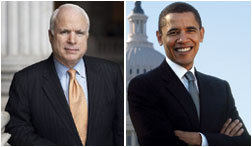As Sens. Barack Obama (D-Ill.) and John McCain (R-Ariz.) enter the post-Labor Day stretch run for the White House, construction officials are poring over the candidates’ statements and records for hints about their infrastructure policies. Whoever wins will have have his hands full in 2009 with bills that will set federal funding and policies in highways, transit and aviation for the next several years.

McCain has longer record; Obama, more detailed plans.
|
The new president “will face an infrastructure problem that needs to be dealt with,” says Brian Pallasch, American Society of Civil Engineers’ managing director for government relations. “Our hope is that there is some new thinking on these issues and there are some new solutions.”
Obama, who is in his first Senate term, has a much skimpier record than McCain, who came to the chamber in 1987. But Obama “has a more fleshed-out platform” on infrastructure, says Greg Cohen, CEO of the American Highway Users Alliance. Obama’s proposals include a $50-billion, short-term economic stimulus, with half of the funding to go for highways, bridges and schools. Longer range, he supports a so-called National Infrastructure Reinvestment Bank to be financed by $60 billion in federal funding over 10 years.
McCain, with his 21-year Senate tenure, “has a track record,” another industry source notes, but says his positions in general are “not really in tune with...the engineering and construction industry.” The GOP nominee has been a vociferous critic of earmarked projects and in 2005 was one of only four senators to vote against what became the SAFETEA-LU highway and transit law. McCain praised his running mate, Alaska Gov.
|
McCain backed gas-tax suspension but Obama opposed the idea. |
Sarah Palin, for shutting down plans for a notable SAFETEA-LU project in her state, a crossing from Ketchikan to Gravina Island, the infamous Bridge to Nowhere. McCain favored temporarily suspending the federal gasoline tax. Many in industry, as well as Obama, opposed a suspension.
On the other hand, in 2003, when McCain chaired the commerce committee, he sponsored a bill that hiked authorizations for airport construction grants.
Jeffrey Shoaf, Associated General Contractors’ senior executive director for government and public affairs, says the public-works funding ideas being floated are too modest. “Even the people talking about infrastructure aren’t facing up to the real needs,” he says.



Post a comment to this article
Report Abusive Comment